Reversible apparently glucocorticoid-induced ascites in dogs: 2024 update
This is the second dog I’ve seen with presumed immune-mediated thrombocytopaenia treated with high doses of prednisolone which developed marked hepatomegaly accompanied by significant volume of ascites.
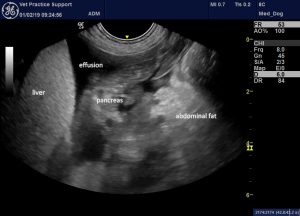
Longitudinal plane view from the right flank showing diffusely hyperechoic liver, anechoic effusion and the body of the pancreas
Both cases received a total daily oral prednisolone dose of 4mg/Kg and developed ascites consisting of modified transudate within one week.
Sonographically the liver was markedly enlarged and diffusely hyperechoic in both cases. No alternative cause of effusion was identified. Neither dog was hypoalbuminaemic; echocardiographic findings were unremarkable with no dilation of the abdominal cava. I find that the portal vein is often hard to visualise well in dogs with significant effusion due to the difficulty of getting the probe head close to the porta hepatis when the abdomen is tense and distended and the abdominal fat is hyperechoic due to the effusion. However, there was no obvious evidence of pre-hepatic causes of portal hypertension such as portal vein thrombosis.
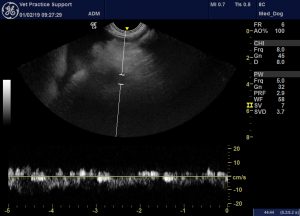
Portal vein flow with colour and PW Doppler
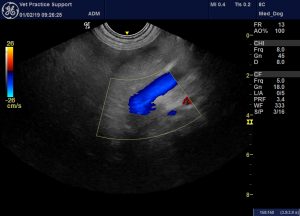
Having trawled through the literature both times, I can find no published reference to this specific phenomenon in either dogs or people. Although, hepatomegaly due to glycogen accumulation after steroid administration in people is reported to be accompanied by histopathological evidence of sinusoidal compression;
J Pediatr Gastroenterol Nutr. 1986 Jan;5(1):41-6.
Hepatomegaly following short-term high-dose steroid therapy.
Iancu TC, Shiloh H, Dembo L.
https://www.ncbi.nlm.nih.gov/pubmed/3944744
It seems plausible that intrahepatic portal hypertension might result; and this would obviously be a potential cause of ascites.
The first of these two dogs was eventually euthanased due to uncontrolled bleeding. The present case recovered uneventfully within a month with complete resolution of ascites within a week of tapering down the prednisolone dose and, at the time of writing, remains healthy without any drug therapy.
2024 Update: This has proved one of the most surprising things that I’ve blogged about. Every year I get two or three more cases described to me by colleagues who’ve seen the same thing.
For example, courtesy of our friends at Medivet Skeldale Hospital in Thirsk
An otherwise healthy, 7 y.o. Cavapoo with a 4 day history of prednisolone treatment 1mg/kg/day p.o.for periocular dermatitis presenting with acute severe ascites without abdominal pain or other signs of illness.
Albumin within normal limits. Raised ALP and ALT.
Thoraco-abdominal ultrasound shows no evidence to suggest R CHF or post-hepatic portal hypertension. Portal vein is grossly unremarkable.
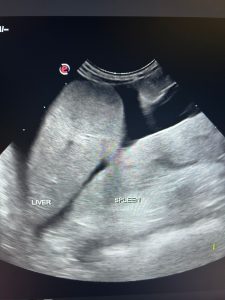
Liver appears congested: diffuse hepatomegaly with peripheral hypoechoic change and central hyperechoic parenchyma. Hepatic veins and cava are not dilated (suggesting that it’s not post-hepatic portal hypertension)
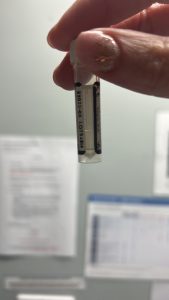
Ascitic effusion: clear fluid, protein 1g/dL, acellular consistent with transudate
This dog’s ascites resolved completely within 4 days of stopping predisolone and he remains well a month later. Remarkable that this can happen at such a modest steroid dose!






Hi,
My daughter ‘s dog, a 4 year old labradoodle, has presented with zero platelets. Diagnosed with IMT and commenced prednisolone 4 mg / kg. She has also developed gross ascites in 1 week on the steroids. In lieu of a further $7500 in diagnostic testing she is being brought home to be weaned off the prednisone and see how she goes.
Regards
Brad
bfakes20@tpg.com.au
that’s sad for her, hope she’s settling down. thanks for dropping us a line – always interesting to get feedback from other similar cases. Roger